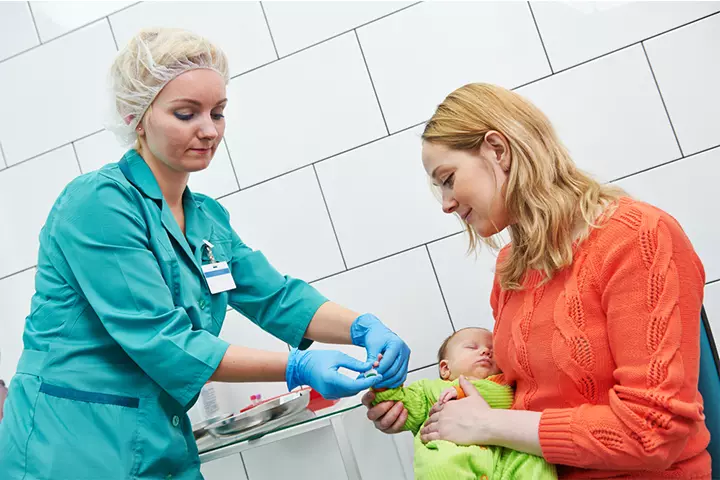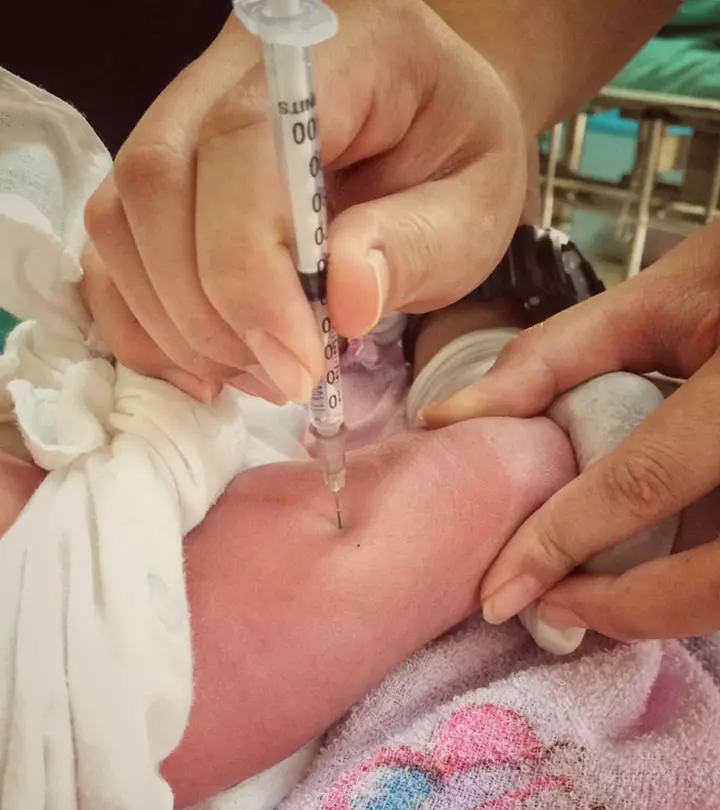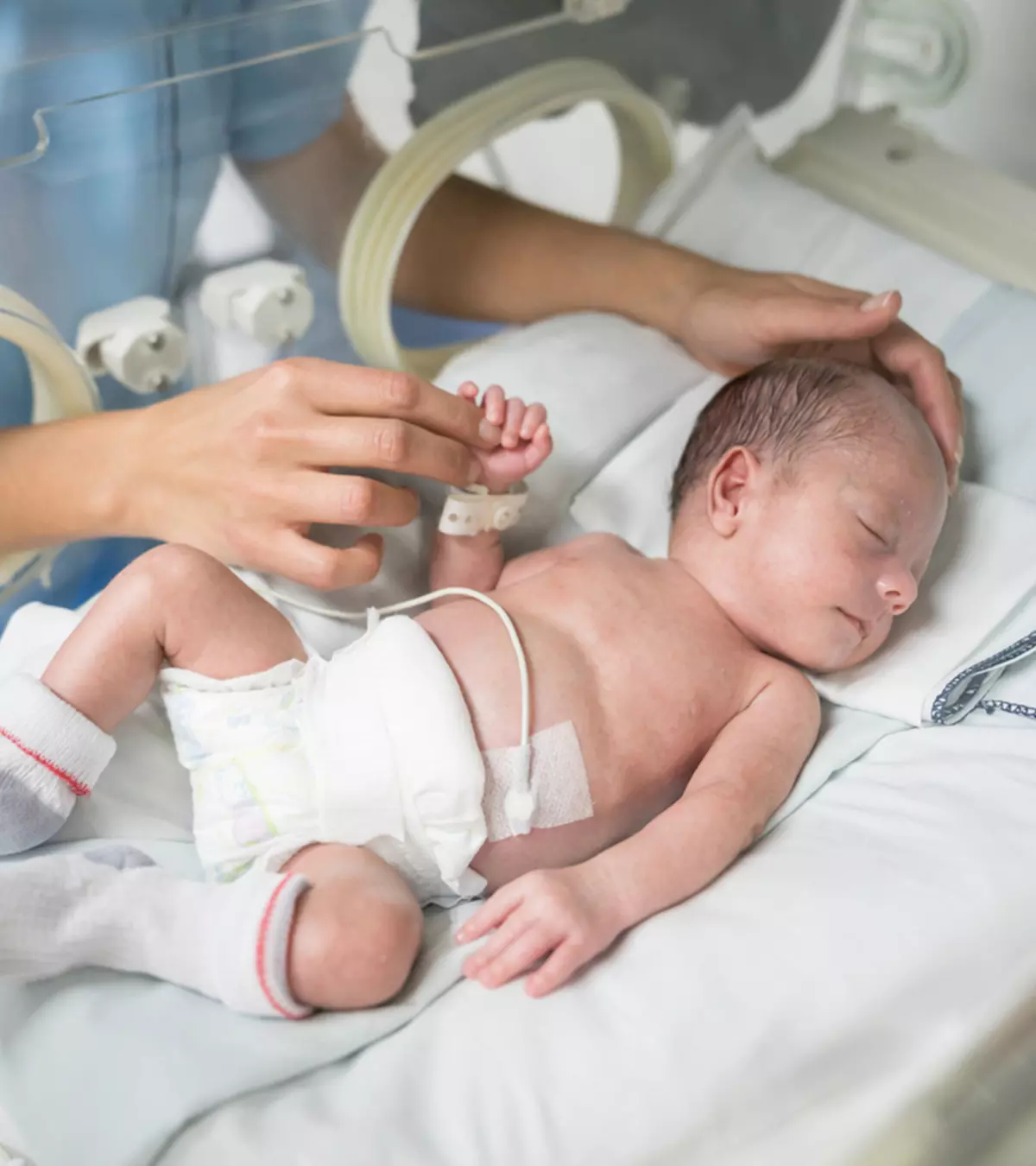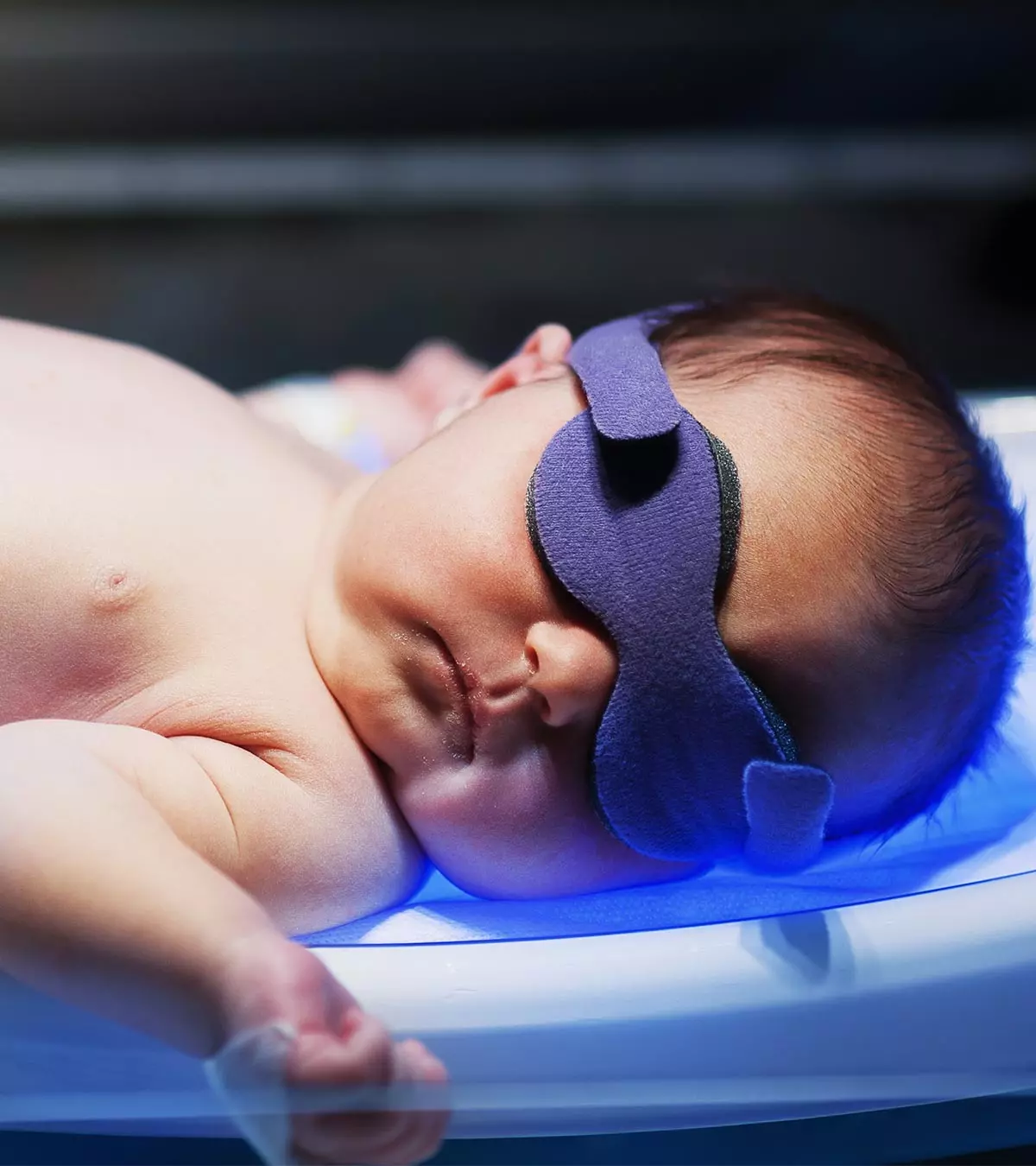
Image: Shutterstock
Jaundice is a condition that leads to the yellowing of the skin and eyes. It is common in both babies and adults. However, newborn jaundice might cause concern in parents. Jaundice in your baby occurs mostly due to the overproduction of a pigment called bilirubin in their body (1). The increased amount of bilirubin is mainly due to the breakdown of the extra red blood cells present in the body before birth. Read about the types, symptoms, risk factors, and treatment for newborn jaundice.
Key Pointers
- Newborn jaundice caused by excessive bilirubin production can be of four types, including pathological and breastfeeding jaundice.
- Symptoms of jaundice include yellowing of the skin and whites of the eyes, fever, and dark urine.
- Untreated jaundice can result in kernicterus, leading to brain damage, movement and speech disorders, hearing impairment, and, in rare cases, death.
- Treatment for newborn jaundice includes exposure to blue light or transfusion.
What Causes Jaundice In Newborns?
Jaundice stems from elevated bilirubin levels in the blood, a condition known as hyperbilirubinemia. Bilirubin, a yellow substance formed during the breakdown of red blood cells, travels to the liver via the bloodstream. The liver transforms bilirubin for excretion through feces. However, an excess of bilirubin, either due to its overproduction or inadequate liver elimination, leads to jaundice.
Jaundice is among the common infant and newborn problems. Newborns are prone to jaundice as their livers are underdeveloped, hindering efficient bilirubin processing. The high red blood cell count in infants contributes to increased bilirubin levels. As a baby’s liver matures over the first two weeks of life, it becomes more adept at managing bilirubin, often resolving jaundice without lasting effects (2).
How Serious Is Jaundice In A Newborn?
Bilirubin levels in a newborn’s body are usually high for the first few weeks after birth. Therefore, seeing the symptoms of jaundice are common. However, if the bilirubin levels continue to remain high or rise further even after the first few weeks, it might make the baby prone to brain damage (3). Thus, it is important to monitor your baby properly throughout this period and inform your healthcare provider immediately if you have any concerns.
 Quick fact
Quick factWhat Are The Types Of Newborn Jaundice?
Jaundice, also known as icterus, in newborns is mainly divided into four major subtypes (4).
- Physiological jaundice: It is the most common type of jaundice seen in babies and does not have any serious side effects. The bilirubin levels usually peak between the fifth and seventh day after birth and disappear by the time the baby is about two weeks of age.
- Pathological jaundice:This type of jaundice occurs within the first 24 hours after birth and sometimes later. It is characterized by peaking bilirubin levels higher than the normal range and may last for more than two weeks. Pathological jaundice may also be sometimes accompanied by dark urine in babies.
- Breastfeeding jaundice:This type of jaundice only occurs in breastfed babies. It is more likely to occur in newborns who do not breastfeed correctly or when the mother’s milk is delayed, leading to dehydration. It usually occurs within 24-72 hours after birth and lasts about three weeks. The bilirubin levels peak between five and 15 days after birth.

- Nuclear jaundice: This is the rarest type of jaundice seen in babies. In this case, bilirubin gets accumulated in the blood in surplus amounts, causing cerebral lesions.
Sometimes, jaundice can also happen because the mother and baby have different blood types, or because of certain conditions such as anemia, hepatitis, or galactosaemia. These are not as common as other causes of jaundice.
 Did you know?
Did you know?What Are The Symptoms Of Jaundice In Newborns?

The main symptoms of jaundice in newborns are the yellowing of the skin and the eyes’ white areas (sclera). The other common symptoms of jaundice can include (5):
- Fever if the bilirubin is very high or the baby has a co-existing infection
- Darker than normal urine
- Light or pale-colored poop if there is some liver problem
 Quick fact
Quick factWhat Are The Complications Of Newborn Jaundice?
If jaundice’s symptoms are left untreated for long, it might lead to a condition called kernicterus. It occurs due to the alarmingly high bilirubin levels in the blood that adversely affects the brain (6). Furthermore, babies, who have recovered from jaundice, are prone to disorders in movement and balance, hearing and speech impairment, and in rare cases, death. Thus, it is important to treat jaundice at the earliest to prevent further complications (7).
How Is Newborn Jaundice Diagnosed?

Higher levels of bilirubin in newborns can be diagnosed in the following ways.
- Performing a blood test
- Checking the skin and eye color for signs of yellowness
- Checking for other signs of jaundice
The American Academy of Pediatrics (AAP) suggests that the bilirubin levels of all newborn babies should be checked along with other signs and symptoms of jaundice before discharging them from the hospital (8).
Brittany, a mother of two and a registered nurse, shares her experience of having her newborn diagnosed with jaundice. She says, “At the time of discharge (after two days of her birth), her bilirubin levels were 7. The doctor said that’s a little bit high but because she’s exclusively breastfed, they weren’t concerned about it. However, after two days, they took her back to the labor and delivery unit to get her bilirubin levels and weight checked.
“Her bilirubin levels were 14.3; it had gone up quite significantly and has a yellowish color. The doctor said that it’s in the mild to moderate level so they wouldn’t do anything at that point and were convinced that it’s related to breastfeeding. So the doctor said to go home and keep an eye on her (i).”
How To Treat Jaundice In Newborns?
In most babies, treatment of jaundice is not mandatory as the levels of bilirubin are not that high and usually get better within a week or two. However, if the symptoms do not go away and the bilirubin levels continue to rise, it may lead to hyperbilirubinemia, requiring immediate treatment.
Some treatment measures that help to cure jaundice in newborns are (5):
- Phototherapy: Phototherapy is a treatment through exposure to a special kind of blue light. Exposure to this light helps reduce bilirubin levels through a process called photo-oxidation. Photo-oxidation is when extra oxygen is added to the bilirubin, helping it dissolve easily in the blood and then be excreted from the body.
- Exchange transfusion: Excess bilirubin levels in the blood may sometimes not respond well to phototherapy. In such rare cases, the baby will need a complete transfusion of blood. The symptoms will significantly decrease since the transfused blood or new blood does not contain bilirubin.
Are There Home Remedies For Newborn Jaundice?

You may try some home remedies to reduce jaundice symptoms. However, it is important to consult your doctor before going forward with any remedies.
- Bask your baby in the morning sunlight from a window’s glass pane. The baby should be undressed for maximum skin exposure to sunlight, and the ambient temperature must be comfortable. Never expose a newborn to direct sunlight since it may lead to sunburns. Make sure there is no draught of cold air when exposing the baby. Regularly follow up with your doctor, as sunlight might not work in many cases.
- Breastfeed your baby often, about 8-12 times a day. Although breastfeeding is associated with jaundice, there is no need to stop breastfeeding unless suggested by the doctor. Frequent breastfeeding may help bring down the bilirubin levels.
Cherie Lim, a mother of two sons and a daughter from Singapore, shares the treatment experience of her 9-day-old son whose bilirubin levels were at 11.1 mg/dL. She says, “The pediatrician recommended supplementing formula milk first to control the jaundice levels since breastmilk will cause the jaundice levels up and do another review in three days’ time. We are to continue sunning the baby in the morning/evening to help bring down the jaundice (ii).”
When To See A Doctor?

If you notice the following symptoms in your baby, it may indicate the worsening of jaundice, and you must consult a doctor (9) (10).
- Signs of weakness
- Reduced frequency of urine
- Low body temperature
- Skin color changes to deeper shades of yellow or orange
- Jaundice has reached the legs
- Excess sleepiness and lethargy
Frequently Asked Questions
1. What should a mother eat when the baby has jaundice?
A mother should follow a healthy balanced diet if their breastfed baby has jaundice. You may consult a certified dietitian to have a diet plan best suited to your needs.
2. What is the major risk factor for jaundice in newborns?
Premature or preterm babies have a higher risk of developing jaundice after birth than babies born at full term. Babies born to mothers with O or Rh negative blood groups may have a higher risk of pathological jaundice.
3. Can infant jaundice be prevented?
Feeding your baby frequently, especially during the first few hours after birth, may reduce the risk of newborn jaundice.
4. Do jaundice babies sleep more?
Yes, babies with jaundice tend to sleep more. This may be due to the high bilirubin levels that cause lethargy and sleepiness (11). Moreover, the production of more carbon dioxide in the body during jaundice is believed to affect the sleep cycle (circadian rhythm), leading to increased sleepiness (12).
5. Do vitamin D drops help with jaundice?
Although the exact mechanism may be unclear, it is believed that vitamin D deficiency may give rise to increased bilirubin levels in the blood. Hence, vitamin D supplementation might help with jaundice by reducing the bilirubin levels through its oxidant property (13). However, speak to a pediatrician before administering vitamin D supplements to your baby.
6. What should be done if jaundice persists?
Symptoms of jaundice may subside with timely medical attention and guidance. However, if the symptoms persist, the child will require further diagnosis and care from a pediatric gastroenterologist who can distinguish the type of jaundice and offer the appropriate treatment.
Newborn jaundice is a common occurrence and often resolves on its own in a couple of weeks. Yellowing of skin and the whites of the eyes are the most notable symptoms of the illness. You must continue to breastfeed the baby as usual and watch out for any worsening signs of jaundice. Treatment is often needed, yet phototherapy could benefit the baby, and blood transfusion is rarely needed. Frequent feeding during the first few hours of birth may prevent newborn jaundice or the worsening of its symptoms.
Infographic: How To Identify Jaundice In Newborns
Jaundice in newborns is common; however, early detection and care can help prevent various complications associated with the condition, including the risk of brain damage in newborns. Check out the infographic below for common symptoms of newborn jaundice and signs requiring immediate medical assistance.

Illustration: Momjunction Design Team
Illustration: Newborn Jaundice: Signs Causes Treatment And Prevention

Image: Dall·E/MomJunction Design Team
Discover neonatal jaundice’s causes, symptoms, and treatments in newborns through an informative video on this common condition.
Personal Experience: Source
MomJunction articles include first-hand experiences to provide you with better insights through real-life narratives. Here are the sources of personal accounts referenced in this article.
i. First week with baby: jaundice episode + postpartum update 1 week.https://www.youtube.com/watch?feature=shared&v=cj20QEdWYgkii. Jerome’s first visit to the pediatrician.
https://cherieladie.livejournal.com/767088.html
References
- Why it’s best not to worry if your baby has jaundice.
https://health.clevelandclinic.org/best-not-worry-baby-jaundice - Newborn jaundice – Causes.
https://www.nhs.uk/conditions/jaundice-newborn/causes/ - Jaundice in newborns.
https://liverfoundation.org/wp-content/uploads/2022/06/Newborn_Jaundice.pdf - Sana Ullah Khaista Rahman et al; (2016); Hyperbilirubinemia in neonates: types causes clinical examinations preventative measures and treatments: a narrative review article.
https://www.ncbi.nlm.nih.gov/pmc/articles/PMC4935699/ - Newborn jaundice.
https://www.nhs.uk/conditions/jaundice-newborn/symptoms/ - What are Jaundice and Kernicterus?
https://archive.cdc.gov/#/details?q=What%20are%20jaundice%20and%20kernicterus?&start=0&rows=10&url=https://www.cdc.gov/ncbddd/jaundice/facts.html - Sayed Yousef Mojtahedi et al; (2018); Risk factors associated with neonatal jaundice: a cross-sectional study from Iran.
https://www.ncbi.nlm.nih.gov/pmc/articles/PMC6108787/ - Management of Hyperbilirubinemia in the Newborn Infant 35 or more weeks of gestation.
https://publications.aap.org/pediatrics/article/114/1/297/64771/Management-of-Hyperbilirubinemia-in-the-Newborn - Jaundiced newborn.
https://www.stlouischildrens.org/health-resources/symptom-checker/jaundiced-newborn - Jaundice in Newborns: Parent FAQs.
https://www.healthychildren.org/English/ages-stages/baby/Pages/Jaundice.aspx - Jaundice in Healthy newborns.
https://www.laleche.org.uk/jaundice/ - Hasan Ozkan et al. (2008); Increased sleep tendency in jaundiced infants: role of endogenous CO.
https://pubmed.ncbi.nlm.nih.gov/18789603/ - Jiayu Huang et al. (2021); Correlation between neonatal hyperbilirubinemia and vitamin D levels: A meta-analysis.
https://journals.plos.org/plosone/article?id=10.1371/journal.pone.0251584
Community Experiences
Join the conversation and become a part of our nurturing community! Share your stories, experiences, and insights to connect with fellow parents.
Read full bio of Dr. Anuradha Bansal
Read full bio of Sanjana Bhattacharjee
Read full bio of Rohit Garoo
Read full bio of Anindita Ghatak



















